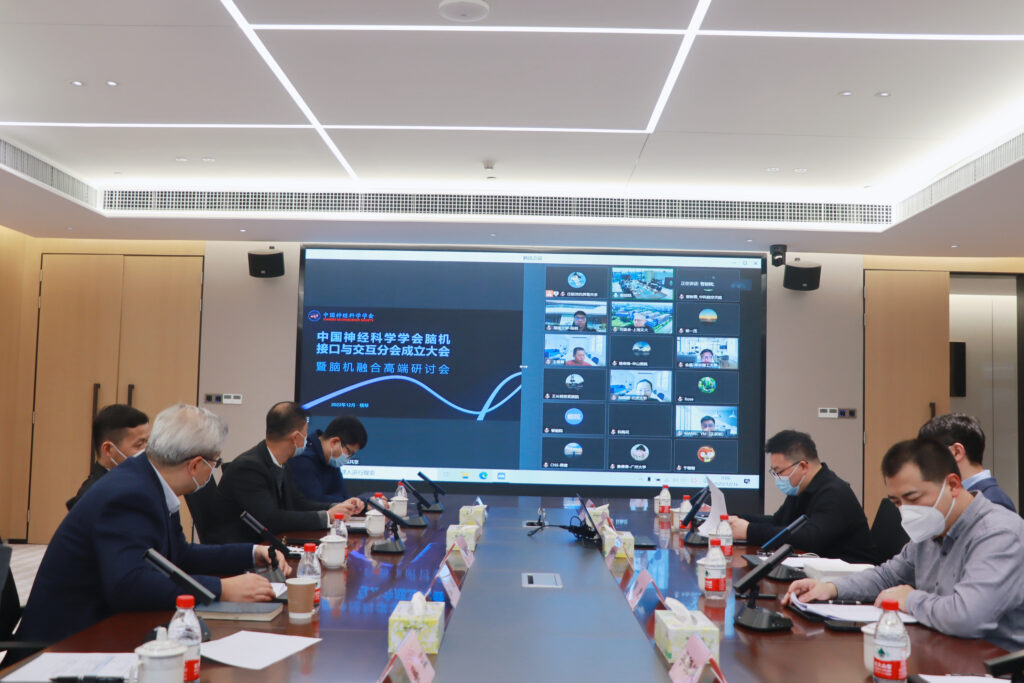In December 2022, the Branch of Brain-computer Interface & Interaction of the Chinese Neuroscience Society (CNS) was officially unveiled in Hengqin, Zhuhai, Guangdong Province, China. Dr. Tiger Tao, Co-founder and Chief Scientist at NeuroXess, Deputy Director of the Shanghai Institute of Microsystem and Information Technology, serves as the founding director.
The following scholars are appointed as the deputy directors of CNS’s Branch of BCI:
Prof. Gang Pan, professor and doctoral advisor of the College of Computer Science and Technology at Zhejiang University
Prof. Lirong Zheng, Vice-president of Guangdong Institute of Intelligent Science and Technology
Prof. Changyong Wang, Deputy Director of the Institute of Military Cognitive Performance and Brain Science, Academy of Military Medical Sciences
Prof. Jingquan Liu, Chairman of Department of Micro/Nano Electronics at Shanghai Jiao Tong University
Prof. Jinsong Wu, professor, doctoral advisor, and specialist in Neurosurgery at Huashan Hospital of Fudan University
Mr. Phoenix Peng, Chief Executive Officer and Co-founder at NeuroXess.

Currently, the Chinese Neuroscience Society’s BCI Brach has 225 members from prestigious universities, research institutes, and enterprises in the field of cutting-edge technology. Dr. Tiger Tao said that the committee will recruit more scientific workers, planning to have a membership of more than 800 by 2023.
Dr. Xu Zhang, a neuroscientist and academician of the Chinese Academy of Sciences, said in the opening speech that BCI technology is indispensable to humanity from medical and social development perspectives. Thus, CNS establishes its BCI Branch, providing a communication platform for the exchange of brain science knowledge and industrial technology among scientific workers.
BCI is an interdisciplinary area that incorporates at least four fields, including neuroscience, signal detection, signal processing, and pattern recognition. BCI technology is the fundamental instrument of neuroscience that scientists must employ to explore cutting-edge brain science knowledge. Without BCI technology, neuroscientists will meet great hurdles in research. Without the knowledge of neuroscience, the development of brain-computer interface devices will lack theoretical support.
In the future, BCI technology will be used as an effective tool to help patients with neurological diseases (such as ALS, high paraplegia, Alzheimer’s disease, aphasia, and auditory impairment) overcome sensory or motor impairments. In other words, it allows those patients with impaired motor-perceptual functions to control external mechanical equipment although they cannot move or talk. Thus, those patients can regain necessary life and social skills, and their life quality can be improved.
Talking about the reason why CNS’s BCI Branch was established, Dr. Tiger Tao explained that on the one hand, BCI Branch offers a communication platform, allowing workers from different fields to exchange knowledge and opinions. The Branch of BCI will strive actively to promote the development of neuroscience in China and support China’s Brain Project. On the other hand, the Branch of BCI can play a significant role in organizing academic activities and in providing guidance on national scientific projects. It thus helps train talents in the field of neuroscience and develop related industries.
It is worth mentioning that NeuroXess signed a donation agreement with the Chinese Neuroscience Society (CNS) previously, setting up the CNS-NeuroXess Young Scientist Award and special-purpose funds to cultivate youth talents in neuroscience, to reward young scientists with outstanding contributions, and to fund activities related to the development of neuroscience, such as academic communication, science popularization activities, and social services. Those funds help advance scientists’ understanding of BCI technology and boost China’s brain science research.
发表回复